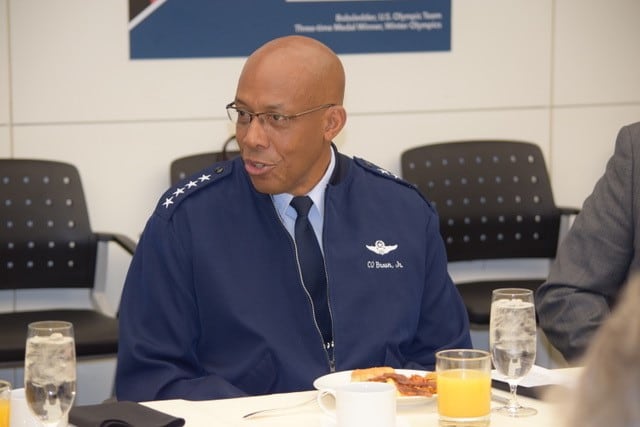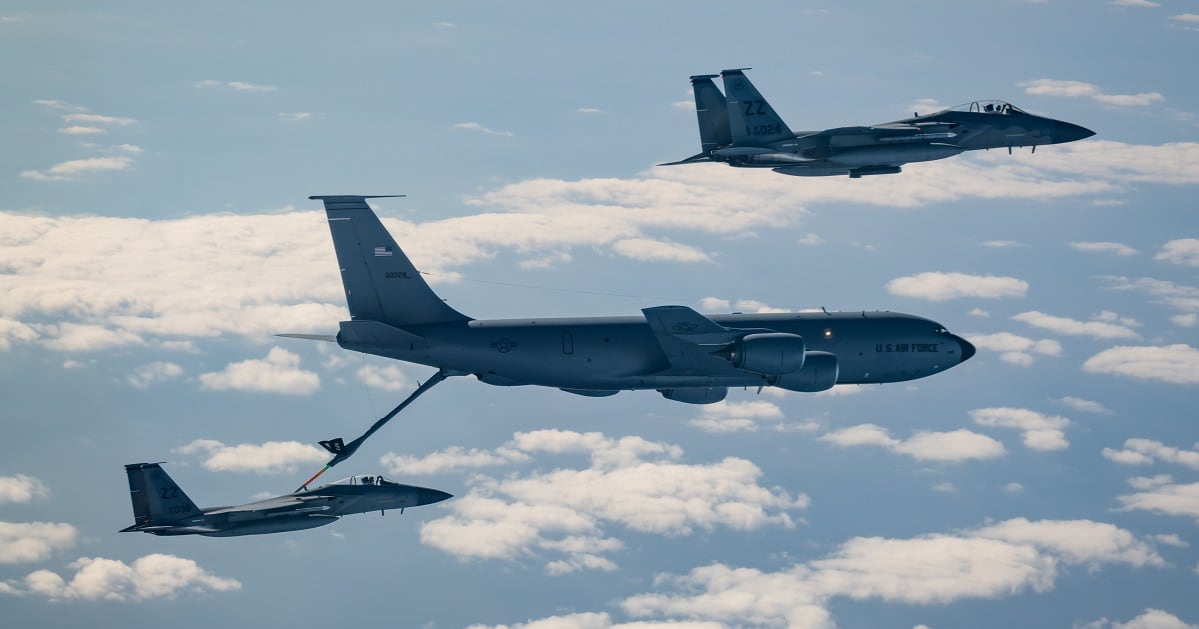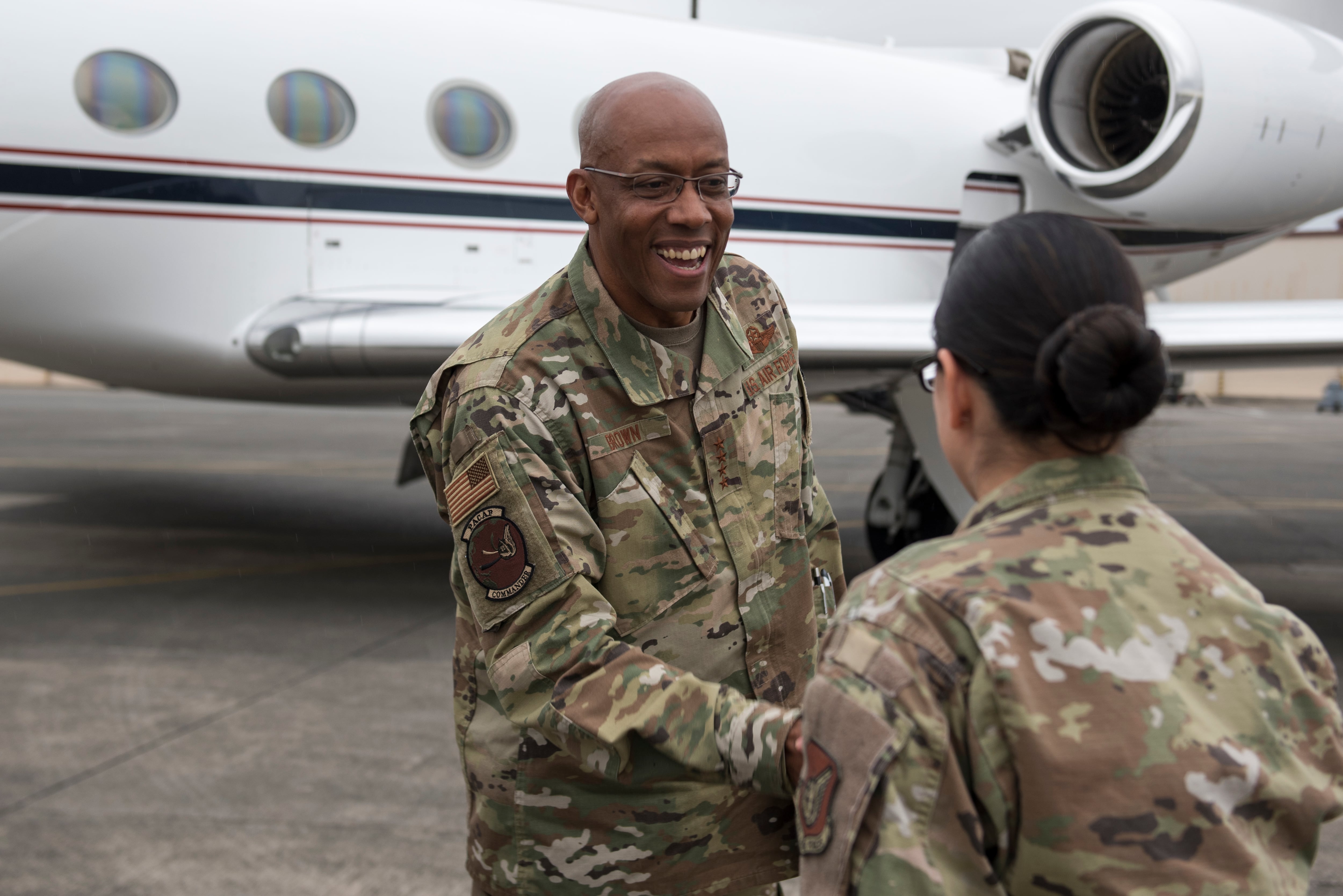WASHINGTON — Gen. Charles Q. Brown has been selected to lead the U.S. Air Force as its next chief of staff, a historic nomination that could make him the first black officer to step into the chief’s role in any of the military branches.
Defense Secretary Mark Esper said in a release Monday afternoon that President Trump had nominated Brown to be the Air Force’s 22nd chief of staff. The Wall Street Journal first reported earlier on Monday that Brown was set to be nominated.
Brown, a highly decorated and experienced F-16 combat pilot, currently serves as commander of Pacific Air Forces. If confirmed by Congress, he will succeed Gen. Dave Goldfein, the Air Force’s chief of staff since July 2016, who will step down from his position this summer and retire.
Brown’s nomination puts him on the path to becoming the first black chief of staff of the Air Force, or any branch of the military services, a historic appointment that could bring more attention to the recruitment and retention of minorities, which have typically been underrepresented at the top ranks of the service.
“I am truly honored and humbled by the nomination to serve as the Air Force’s 22nd chief of staff,” Brown said in an Air Force release Monday. “If confirmed, Sharene [his wife] and I look forward to building upon the legacy of Gen. Dave and Dawn Goldfein and the many airpower giants before who have served our Air Force and our nation with such dedication.”
Air Force Secretary Barbara Barrett said in a tweet that the service “will be well served by the formidable talents of CQ Brown.”
“He has unmatched strategic vision & operational expertise,” Barrett said. “His leadership will be instrumental as the service continues to focus on the capabilities & talent we need to implement the” National Defense Strategy.
Goldfein also tweeted his congratulations to Brown, and endorsed him as “one of the finest warriors our [Air Force] has ever produced.”
“He’s led worldwide — in the Pacific, Europe, the Middle East and Africa,” Goldfein said. “When it comes to global, operational savvy, there’s nobody stronger.”
Esper said in the Air Force’s release that the chief of staff’s work is important and difficult, and will only grow more complicated as the military shifts to focus on “great power competition” against peer or near-peer nations such as China or Russia.
“With Gen. CQ Brown’s nomination comes the right level of talent and experience for the job to hone airman lethality and readiness, strengthen bonds with allied and partner air forces, and to do this efficiently,” Esper said.
Former top Air Force officials praised Brown as a thoughtful and battle-tested leader, who inspires his airmen and has the vision to take the Air Force where it needs to go.
“He’s got fantastic operational experience,” former Air Force Secretary Deborah Lee James said in a Feb. 24 interview, as rumors circulated about Brown’s potential selection. “He tends to be popular with his troops. People want to follow him — he doesn’t lead out of fear, he leads through the inspiration he brings to the table.”
Brown sets the example and expects those under his command to follow it, said retired Gen. Herbert “Hawk” Carlisle, the former head of Air Combat Command, who has worked with Brown multiple times over the decades. Brown gives his airmen the leeway to try new things in hopes that they’ll succeed, Carlisle said Feb. 24 — but if they make mistakes in the process, Brown takes care of his airmen and helps them learn from those mistakes.
Brown, whose call sign is “CQ,” does not shy away from taking on hard jobs or making tough decisions, said Carlisle, who is now president and chief executive officer of the National Defense Industrial Association. Carlisle would not comment on the record about whether Brown had been picked.
“He’s not going to pass the buck, and he’s not going to ask somebody else to do the difficult ones,” Carlisle said. “He’ll be the one that steps up.”
In the months proceeding his nomination, Brown was widely perceived as a lock for the chief of staff nomination due to his extensive command experience in the Asia-Pacific region, Middle East and Europe.
“He’s got a global view,” Carlisle said, adding that Brown has a thorough understanding of all three of those regions.
RELATED

He would serve as chief of staff at a time when the Air Force is struggling to balance the near-term costs of ongoing operations in the Middle East with long-term investments seen as necessary to counter a rising China and resurgent Russia. Brown’s first major obstacle could be bridging the interests of combatant commanders across the globe with the traditional priorities of Air Force headquarters, such as modernization and growing the force.
Before being named as head of PACAF in 2018, Brown was deputy commander of U.S. Central Command for two years. From 2015 to 2016, he served as U.S. Air Forces Central Command’s combined force air component commander, where he oversaw the bombing campaign against ISIS in Iraq and Syria, as well as operations against insurgent groups in Afghanistan.
He also previously served as deputy director for CENTCOM’s operations directorate, deputy commander for AFCENT, and director of operations, strategic deterrence and nuclear integration for U.S. Air Forces in Europe-Air Forces Africa at Ramstein Air Base in Germany.
After graduating from Texas Tech University, Brown was commissioned in 1984 and began undergraduate pilot training the next year at Williams Air Force Base, Ariz. Much of his early career was spent as an F-16 pilot and instructor, with assignments at the 35th Tactical Fighter Squadron at Kunsan Air Base in South Korea, Homestead AFB in Fla., and the elite U.S. Air Force Weapons school at Nellis AFB, Nev. He later served as the school’s commandant from 2005 to 2007.

Brown also served as aide-de-camp to former Chief of Staff Gen. Ron Fogelman in the mid-1990s, and commanded the 8th Fighter Wing at Kunsan Air Base in South Korea and the 31st Fighter Wing at Aviano Air Base in Italy.
Brown has clocked more than 2,900 flying hours — including 130 combat hours — in the F-16 as well as 15 other aircraft such as the B-1, B-2, B-52H, C-130J, E-8C, HH-60G, KC-135 and MV-22.
James said that when she worked with Brown, he was always well-prepared and left her feeling confident he could get the job done.
“He always had an endgame in mind,” James said.
RELATED

Carlisle described Brown as quiet and a “little bit of an introvert,” and someone who brings a breadth of knowledge and experience to the job. Brown has “great credibility” with the joint world, having served in multiple leadership roles at AFCENT and CENTCOM, working with other services.
James said that the chief of staff of the Air Force needs to have diplomatic skills to get along with everyone, to include lawmakers on Capitol Hill, officials from allied countries and leaders of other services as a member of the Joint Chiefs of Staff. Brown’s time at CENTCOM, AFCENT and in Europe has left him with plenty of experience to build those bridges, she said.
His ability to inspire airmen will be important as chief of staff, James said. When he heads out to bases to hold all-calls, she expects he will leave airmen energized and excited about the Air Force, which is important for recruitment and retention.
During tough budget debates years ago, while Carlisle was Brown’s boss, Carlisle was struck by the way he could be “passionate but impersonal” — arguing hard for his point of view, but knowing that compromise is ultimately necessary.
And when Brown was at AFCENT while Carlisle ran ACC, Brown would step up and take the lead during challenging situations, such as multinational negotiations with Gulf countries.
Brown is an athlete and “gym rat” who spends a lot of his free time exercising, Carlisle said. Brown and his wife have two grown sons.
Brown is also a voracious reader, Carlisle said, who enjoys learning about history and tears through books on subjects ranging from the Revolutionary War era to current events, as well as books on self-improvement.
“People will be impressed with him,” Carlisle said. “He’s a quiet guy, but when he speaks, people will listen. People see the depth of his personality once they get to know him.”
“He’s a great role model for young kids to look up to,” Carlisle said. “All those leadership things that are part of the makeup of what’s a good chief, he’s got them all.”
Stephen Losey is the air warfare reporter for Defense News. He previously covered leadership and personnel issues at Air Force Times, and the Pentagon, special operations and air warfare at Military.com. He has traveled to the Middle East to cover U.S. Air Force operations.
Valerie Insinna is Defense News' air warfare reporter. She previously worked the Navy/congressional beats for Defense Daily, which followed almost three years as a staff writer for National Defense Magazine. Prior to that, she worked as an editorial assistant for the Tokyo Shimbun’s Washington bureau.





